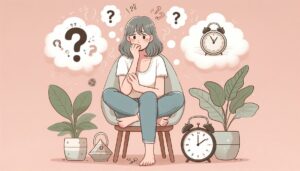An Experience of Social Anxiety
Social anxiety consumes your life, impacting day-to-day functioning including work, study, relationships, hobbies - isolating you from family and friends.
Imagine you have to attend a work meeting plus evening out in 2 weeks, where you know you’ll have to speak, present, and interact.
Already you are feeling an overwhelming sense of fear, dread and anxiety. You can’t cope with these feelings, you would give anything not to go. You’re trying to come up with reasons not to, anything to stop feeling like this.
When in a social situation your anxiety instinct means you often focus inwards. Questioning how you are presenting yourself - do you sound stupid? Have you gone red with embarrassment? Can people see you sweating? Are your clothes ok? Are you saying enough, saying too much?
You become so focussed on yourself that you forget to focus on others, you struggle to focus on the conversation going on around you as you scramble in your mind to think of something to say.
Your heart is pounding, you feel sick, your throat feels dry. You can feel yourself blushing and have an image in your mind of yourself looking bright red and sweating with everyone laughing at you. You drink the water you always carry with you in social situations.
All you want to do is escape this situation and run away to quiet safety.
You wait until you think it’s a reasonable time to retreat back to your own quiet sanctuary.
But the nightmare doesn’t stop there, your mind continues it.
You walk through every single tiny detail of the social interaction. What you said, what you did, how you looked. You put yourself under a microscope to focus on what you perceive as wrong.
You dissect how others reacted to you, did they think you were too quiet, too talkative? Did they notice the bright red tomato blush of your cheeks when you tried to engage in the conversation?
Once you’ve done this and you’re thoroughly convinced of how ridiculous you were, you curl up exhausted vowing to never leave the house again.

What is Social Anxiety?
Social anxiety, also termed social phobia, is an anxiety disorder that’s long term and is an overwhelming fear of social situations. The fear is persistent and affects many areas of life including work, study, hobbies, anything where there is a social interaction. It is an isolating disorder, which by its nature, can make it difficult to ask for help.
It often begins during teenage years, and although it may fluctuate over time, usually it doesn’t go away without treatment.
It isn’t shyness or being anti-social.
What Might Trigger Social Anxiety?
As social anxiety is a disorder where the individual feels fear and anxiety in social situations where they might be judged, or generally “seen”, it means it isn’t just a fear of being with people. It can also be experienced when communicating via phone and video which is becoming more evident with an increase in our working from home culture utilising video technology to communicate.
People with social anxiety often experience feelings of anxiety and dread about an upcoming social situation way ahead of the actual event, having a huge impact on everyday life.
It can be triggered in any social situation, such as eating in public, using public transport, or being in public spaces.
The fear of seeming incompetent can be excruciating, making it difficult to undertake tasks whilst others are watching, fearing any criticism or judgement.
Fear of the body responding to feeling anxious or embarrassed, for example blushing or sweating can trigger intense anxiety and embarrassment.
What Symptoms Might Be Experienced?
Social anxiety is felt in the body. For example:
- Feeling sick.
- Having a dry mouth.
- Heart palpitations or a pounding sensation.
- Dizziness.
- Trembling
- Sweating.
- Butterflies in the stomach.
- Feeling disconnected.
- Some people experience panic attacks.
It is also felt in the mind, with thoughts that might include:
- Telling yourself you can’t cope.
- That everyone is staring at you.
- People are laughing at your anxiety.
- That you are dull, boring and shouldn’t be here.
- That you are useless.
- You may have images of yourself looking and sounding anxious with people laughing at you.
- Ruminating and dissecting everything you said and did during a social situation after the event.
In trying to cope with the symptoms of social anxiety, coping strategies are utilised to try and manage these experiences. These coping behaviours can include:
- Avoidance of social situations.
- Time rehearsing things to say before going into a social situation.
- Avoiding eye contact.
- Fidgeting or fiddling with clothes or hair.
- Giving compliments to others.
- Avoiding any conflict.
- Keeping water available.
- Use of alcohol or drugs to feel more confident.
- Internal self-focus - for example focusing on trying not to blush, or saying the wrong thing by monitoring your thoughts and body sensations.
- Ruminating over the event and dissecting everything that happened. What you said and did and the response of other people to you.
Unfortunately these behaviours can have the effect of maintaining the difficulties as there are no opportunities to test out the beliefs. They can also become problems themselves.

What Can Help?
Social anxiety is a disorder, but that doesn’t mean there is something wrong with the individual. Anxiety is designed to help, it just can’t distinguish between a real and perceived threat. People are social, we have evolved as social beings as it supports our survival. Therefore social approval is considered vital, which can lead to intense anxiety if we believe we aren’t acceptable.
Although social anxiety can be incredibly debilitating, cognitive behavioural therapy (CBT) is a talking therapy with a successful evidence base in treating social anxiety.
If you are suffering with social anxiety your CBT therapist works closely with you to understand your unique cycles. For example how your thoughts, feelings (emotional and physical), and behaviours interact and keep the problem going. All with the aim of breaking these cycles and freeing you from its grip.
You don’t have to live with social anxiety, it isn’t just shyness and it can stop you living the life you want.
As an experienced and accredited CBT Therapist I can help you be released from symptoms of anxiety and work with you to break free from your social anxiety.
If you want to find out more about working together, please contact me to arrange an initial consultation.


